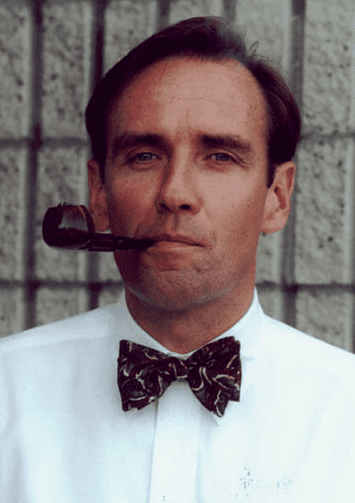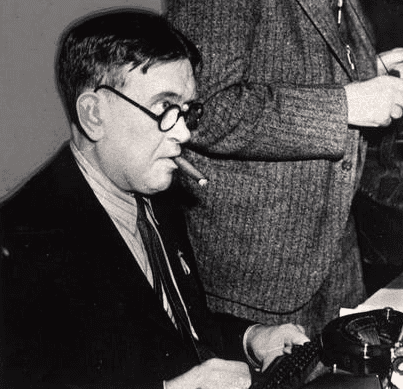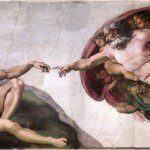 D. G. (Darryl G.) Hart, in spite of donning a bow tie, is an exceptional scholar, thinker, and writer. His latest is about one of my favorite writers and appears in the most unlikely of locations: in the Library of Religious Biography. It is unlikely because this series concerns major religious persons while this book is on the most irreligious of characters, none other than H.L. Mencken. The book is called Damning Words: The Life and Religious Times of H.L. Mencken.
D. G. (Darryl G.) Hart, in spite of donning a bow tie, is an exceptional scholar, thinker, and writer. His latest is about one of my favorite writers and appears in the most unlikely of locations: in the Library of Religious Biography. It is unlikely because this series concerns major religious persons while this book is on the most irreligious of characters, none other than H.L. Mencken. The book is called Damning Words: The Life and Religious Times of H.L. Mencken.
Many have no idea who Mencken is — a famous journalist, author, opinion-ator from Baltimore. He was known (and still is) for his caustic approach to religion, not least in his coverage of Bryan’s famous Scopes Trial in Dayton TN, and this forms the backdrop for Hart’s informed, unfootnoted, constantly-quoting biography. I’ve read Terry Teachout’s spectacular biography of Mencken called The Skeptic, but I like Hart’s improvement of Teachout’s because of Hart’s finesse with the religious environment of Mencken, and environment that caused Mencken’s negations and vituperations to be a witness to the religious world of Mencken. Hart does this well, perhaps a little too well (see below), and it sheds light on Mencken himself. [Image of Hart]
Hart sees Mencken through the grid of the Enlightenment, through his German background, and through his stubborn make-up and contrariness against the religious and moral assumptions of a very Christian society that annoyed him from sunup to sundown and well beyond. I have been reading Mencken for years but can only read him in small bits as his acid tongue and sacrilegious and blasphemous beliefs, bound up as they always are in the strongest forms of rhetoric possible, become too much. But in bite size chunks, the man is a hoot and quotable and sometimes insightful into the Christian faith. I agree with Hart that Mencken was brilliant at what he did.
Even though Mencken would eventually be received into communion in the Lutheran church, his dissent from American pieties contributed to his emergence as one of the most astute observers of American Christianity whose mocking might have done more good for the body of Christ if his devout readers had not been so shocked by his irreverence (10).
[Mencken] The Methodists avoided everything of that kind. They surely did not neglect Hell in their preaching, but when they lifted up their voices in song they liked to pretend that they were booked to escape it (16).
 His father was a tobacconist and had a business he expected Mencken to follow, but H.L. was unsuitable to the business at all levels and a failure at it and he was saved when his father died early. His journalism led to a scientific approach — just the phenomena — and to a distance safe for judgment, which became his living. Here are some of Hart’s finer descriptions of Mencken’s mode: [Image of Mencken]
His father was a tobacconist and had a business he expected Mencken to follow, but H.L. was unsuitable to the business at all levels and a failure at it and he was saved when his father died early. His journalism led to a scientific approach — just the phenomena — and to a distance safe for judgment, which became his living. Here are some of Hart’s finer descriptions of Mencken’s mode: [Image of Mencken]
In his own words, a “private editorial column devoted wholly to my personal opinions and prejudices” “launched me as a general assassin” (59).
Mencken’s column stood out, not only because it was signed or because it was provocative, but also because the rest of the editorial page was so dull. He went out of his way to be controversial. The trick was to expose frauds, which fit in with progressive reformers and muckrakers. But Mencken’s knack was to bring to light all shams—even those of do-gooders. Demonstrating hypocrisy was too easy for Mencken. His outlook highlighted the gap between human idealism and execution, especially among the uplifters and moralizers who thought they could actually improve people, society, or governments (60).
Why was Mencken like this? Hart begins to explore this at times and here’s an example, and I will say more about this below, for Mencken was a German, idealized the place and especially it’s arch critic, Friedrich Nietzsche:
He located the source of his outlook as “fundamentally anti-Anglo Saxon” and said that if he had “any spiritual home at all it must be in the land” of his German ancestors. For Mencken, England represented a form of self-righteous smugness that he associated with democracy and egalitarianism while Germany still upheld the ideal of the superior man and distinguished civilization unadorned by the sentimental trappings of equality (85).
From Mencken’s reading, the enlightenment championed by Nietzsche was an acquired taste for superior men. The lower castes could still have their old beliefs” (87).
Mencken is famous for his quotables about Puritanism. Thus, “Puritanism is the haunting fear that someone, somewhere, may be happy” and “Show me a Puritan and I’ll show you a son-of-a-bitch.” For Mencken Puritanism was as much the imposing of one’s views via politics, law, and social mores as it was a theology or a historical movement. Hence, it becomes a cultural force he despised, and it was one that left him on the outside. Hence, “At the bottom of Puritanism one finds envy of the fellow who is having a better time in the world, and hence hatred of him. At the bottom of democracy one finds the same thing. This is why all Puritans are democrats and all democrats are Puritans” (81).
As he wrote in A Book of Prefaces, underneath the various legislative aspects of Comstockery [imposition theme again] was “the dubious principle—the very determining principle, indeed, of Puritanism—that it is competent for the community to limit and condition the private acts of its members” (107).
As much as Mencken clothed his invective in the fabric of invective, his was a naysayer’s that defied categories. It was one part village atheist and one part town drunk. He loathed the legislation that the devout passed, especially since the laws affected him directly. But he was an amiable critic who, rather than letting his believing inferiors get the better of him, decided to play along. Mencken was fully patriotic and arguably among the most anti-American of Americans (129).
I have two criticisms to raise of Hart’s fine book, and they are not much more than tweaks. First, while Hart clearly has pointed to a feature of Mencken’s motherlode, I don’t think he sees its importance enough: Mencken was a wannabe aristocrat, a high brow wannabe, but he had an inadequate education arising from a working class into an inadequate location in society. To be sure, Mencken was a stunningly great writer — regardless of contents — and he impacted American society noticeably. But a deep-seated ambition drove him and out of that ambition Mencken took deep refuge in Germany, which he idealized into a country of superior men as expressed by Nietzsche, and his perch then became as a perceived outcast that developed into a sustained resentment against all things American, all things “Puritan,” and all things established. Hart sees these themes but they deserve more attention and it seems the grid of “resentment” could be brought into play.
“In a few years,” he wrote, “the Mencken family will be at an end.” He wondered if he would have had an easier life in Germany, and concluded that he still found “it impossible to fit myself into the accepted patterns of American life and thought.” He confessed that he remained “a foreigner” (219) Germany had been a source of his sense of superiority—a civilized nation of superior men—that provided a world historical perch from which Mencken could look down on Anglo-American moralism and progressivism (223).
[Mencken on USA] Here the general average of intelligence, of knowledge, of competence, of integrity, of self-respect, of honor is so low that any man who knows his trade, does not fear ghosts, has read fifty good books, and practices the common decencies stands out as brilliantly as a wart on a bald head, and is thrown willy-nilly into a meager and exclusive aristocracy (225).
My biggest criticism of this book on Mencken is that Hart is too appreciative and not critical enough. Mencken wears thin and only so much can be taken of the man before he becomes a total turn-off. The man never missed an opportunity to criticize Christianity and Jesus and his take on Jesus is that of Nietzsche. During an election season once again shaped too much by the Christian faith, we find this:
Protestant dignitaries, he observed, were agitated about the political polemics and called for a return to the simple faith of Christ who “preached no complicated mysteries and demanded no pedantic allegiance.” As much as Mencken, a man who “loved peace and deplored the uproars now going on,” preferred this approach, he concluded that the religion of Jesus was as unworkable in 1920s America as it was in first-century Palestine. The Sermon on the Mount was a “sweet dream,” but with “no more reality than a young man’s hallucination of the damsel who has snared him” (183).
In a book on his religious faith, while Hart is unafraid to cite some of Mencken’s harshest of terms, Hart seems to want to rescue the man into a religious biography on account of the environment. Too often Hart quotes the harshness but then points out how alert Mencken was to the nuances of the Christian faith.
With the subtext of a twinkle in his eye, he observed the ironies and folly that generally attended attempts to express or capture the higher truths. Mencken mixed sarcasm and respect for religion in ways unrivaled by other debunkers, iconoclasts, or skeptics (205).
This respect, while it had nuance (and Hart points me to his perception and appreciation at some level of Machen), emerged at some level as a kind of courtesy perhaps. Mencken was a vulgar critic of the faith and his vulgarity needs to be emphasized more.












